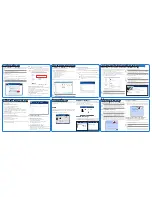
Package contents
Home Server TS mini
Quick Start Guide
Home network scenario
SPLENDID
MENU
Router
HOME SERVER TS mini
Multimedia Devices
Desktop PCs
Notebook PCs
HDD
Internet
SPLENDID
MENU
HDD
Internet
SPLENDID
MENU
Remote Access
Setting up your TS mini
E-SATA
1
2
3
Installing the Software on Your First Computer
1
1. Insert the Software Installation CD into the computer that is connected to your home network. The Windows Home Server Connector wizard starts.
If Autorun is NOT enabled in your computer, browse the contents of the Software Installation CD to locate the
Install.exe
file. Double-click the
Install.exe
to run the Connector wizard.
2. Click Next, and then follow the onscreen instructions to finish the installation and the Windows Home Server Setup. You will be required to set the server
name, administrator password, and several settings.
2
1
2
1. Connect the supplied power cord to the supplied AC adapter. Then, plug the AC adapter to the
DC IN
jack on the TS mini rear panel and the power cord
to an electrical outlet.
2. Connect one end of a network cable to the
LAN
port on the server rear panel, and the other end to your broadband router.
You must use a network cable to connect the TS mini to your broadband router. Wireless connection to your broadband router is not supported.
However, after you connect your server to your home network, home computers can connect to your server through wireless connection.
3. Press the power switch on the top panel to turn on the TS mini.
Getting started
3
1
2
1. Double-click the Windows Home Server icon
to bring up the logon window, and then enter the administrator password to log on to the Windows Home
Server Console.
2. On the Windows Home Server Console interface, you can start to remotely view, add, share, and protect important files on your home server. Turn over this
Quick Start Guide to see what you can do with the Windows Home Server Console.
2
1
1
2
1
1
2
2
1
1
1
2
1
1
2
2
1
1
2
1
1
2
2
1
1
1
2
1
1
2
2
1
1
2
1
1
2
2
1
1
1
2
1
1
2
2
1
1
2
1
1
2
2
1
1
1
2
1
1
2
2
1
1
2
1
1
2
2
1
1
1
2
1
1
2
2
1
1
2
1
1
2
2
1
1
1
2
1
1
2
Add
ing a hard disk drive
1
2
3
4
5
1. Install the new HDD to the home server.
Always install the hard disk drive in which the OS is or will be installed to
the HDD1 bay.
(a) Power off the server and unplug the power cord.
(b) Lay the server horizontally on a stable surface, and then loosen the two
thumbscrews to remove the left side case.
(c) Use a coin to loosen the three screws and put the screws at a visible
place in case they are lost.
(d) Hold the plastic grip, and then lift up the HDD cage horizontally.
(e) Reverse and place the HDD cage on the stable surface.
(f) Fasten the bundled four screws to the new HDD, and then slide the
HDD into the empty HDD bay.
(g) Hold the plastic grip and align the two pins on the cage as shown to the
mounting holes. Push down the HDD cage to the right side case.
(h) Fasten the three screws which were removed and put aside at the
beginning.
(i) Slide the left side case back to the server body, and then fasten the two
thumbscrews back to the case.
1
2
3
4
5
2. Add the new hard drive to Server Storage on the Windows Home
Server Console.
(a) Log on to the Windows Home Server Console.
(b) Click the Server Storage tab.
(c) Select the newly added hard drive (either internal or external) and then
click Add to bring up the Add a Hard Drive Wizard. Click Next.
(d) Select from the following options:
• Add this hard drive to your server storage to increase the
storage capacity of your home server.
• Use this hard drive to back up files that are stored on your
home server.
(e) For detailed instructions, refer to the Windows Home Server Console
Help.
Ensure that the newly installed hard drive must have 36GB capacity at
least or else the HOME SERVER cannot recognize the hard drive.
HDD
Internet
SPLENDID
MENU
TS mini
AC adapter
Power cord
RJ45 LAN cable
Software Installation
CD
Recovery DVD
User Manual
Restore CD
User manual
Quick Start Guide
HDD screws package
Warranty card
Quick S
tart Guide
Warranty C
ard
HDD2 HDD1
E5046
15G065278000




















